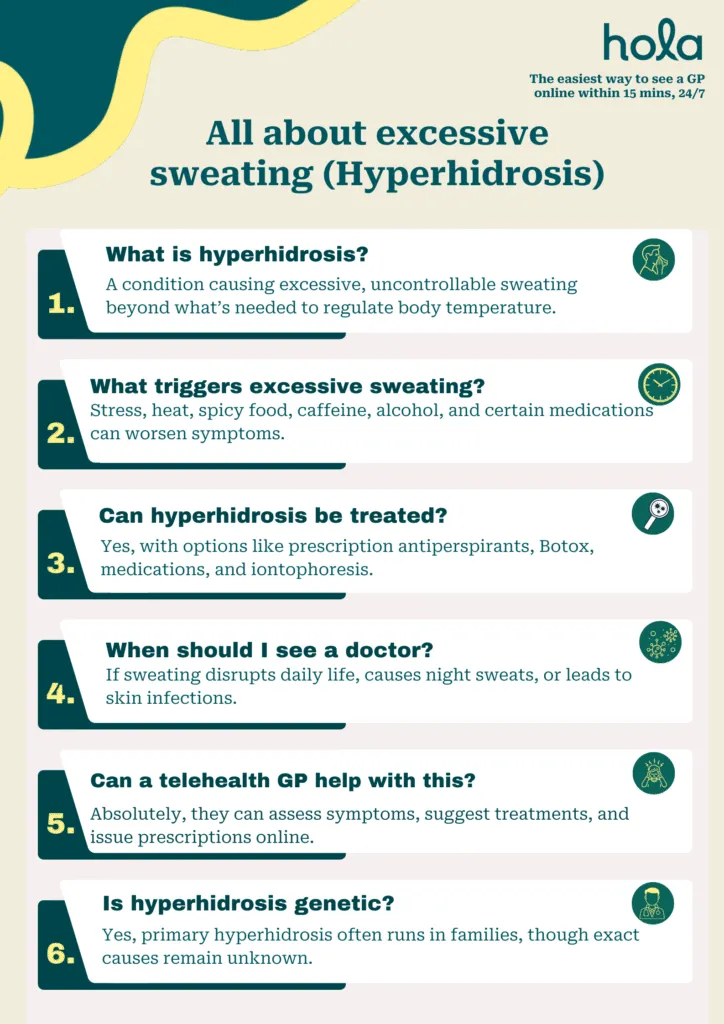Excessive sweating (hyperhidrosis) causes & treatment – A GP guide
Written by Dr.Gosagan Gopalakrishnan, BSc (Hons), MBChB, DRCOG, MRCGP, FRACGP.

Contents

Summary: Excessive sweating, or hyperhidrosis, is a common condition where the body produces more sweat than needed to regulate temperature. It can be caused by overactive sweat glands, medical conditions, medications, or stress. Treatments range from strong antiperspirants and Botox to medications and home remedies. While it’s often manageable, persistent symptoms should be assessed by a doctor and a telehealth GP can provide fast, discreet help from home.
I was recently travelling for work and found myself in an Uber during the Formula One Grand Prix weekend in Melbourne. My driver was a larger gentleman – not uncommon these days – and while he was perfectly pleasant, the car was filled with a noticeable odour of sweat and something reminiscent of a yeast infection. It got me thinking about this blog. Excessive sweating, or hyperhidrosis, is a surprisingly common and often distressing condition that can impact daily life, self-confidence, and comfort. While sweating is a normal bodily function, hyperhidrosis can be unpredictable and challenging to control. In this guide, we’ll explore the causes, treatments, and practical strategies for managing excessive sweating.
What is hyperhidrosis or excessive sweating?
Hyperhidrosis is a condition where the body produces more sweat than is necessary to regulate temperature. It can occur in specific areas (such as the hands, feet, underarms, or face) or affect the entire body. There are two main types:- Primary hyperhidrosis – Excessive sweating without an underlying medical cause, often localised to certain areas.
- Secondary hyperhidrosis – Excessive sweating caused by an underlying medical condition or medication.
Symptoms and causes
Hyperhidrosis is characterised by:- Excessive sweating unrelated to heat or physical activity
- Sweating that soaks through clothing
- Persistent dampness of hands, feet, or underarms
- Increased risk of skin infections due to constant moisture
- Overactive sweat glands (idiopathic in primary hyperhidrosis – meaning the cause is unknown)
- Medical conditions such as diabetes, infections, or thyroid disorders
- Certain medications, including antidepressants and pain relievers
- Menopause and hormonal changes
- Anxiety or stress-related sweating
Other possible causes of constant sweating
Sometimes, excessive sweating is not due to hyperhidrosis but other conditions such as:- Infections – Tuberculosis, HIV, or long-term infections can cause night sweats.
- Neurological conditions – Disorders like Parkinson’s disease can affect sweat regulation.
- Obesity – Excess body weight increases body temperature, leading to more sweating.
- Low blood sugar (hypoglycaemia) – Can cause sweating as part of the body’s response.
Triggers that cause sweating
Certain factors can worsen sweating, including:- Hot and humid weather
- Stress, anxiety, or emotional distress
- Spicy foods and caffeine
- Physical exertion
- Alcohol and nicotine
Experiencing these symptoms? Speak with a doctor within 15 minutes.
See a Doctor now
Available 24/7, across Australia.
Types of hyperhidrosis
- Focal (primary) hyperhidrosis – Localised sweating (e.g., hands, feet, armpits, face) without an obvious medical cause.
- Generalised (secondary) hyperhidrosis – Widespread sweating due to an underlying medical condition.
When to consult a doctor
You should see a doctor if:- Excessive sweating disrupts daily activities or confidence.
- You experience night sweats without a clear cause.
- Sweating is accompanied by weight loss, fever, or rapid heartbeat.
- Home remedies and over-the-counter treatments are ineffective.
- You are concerned about infections in your skin folds, caused by excessive sweat.
How is the cause of excessive sweating diagnosed?
A GP may diagnose hyperhidrosis through:- Medical history and symptom discussion
- Physical examination – Assessing affected areas.
- Blood tests – To check for underlying conditions like thyroid disorders or diabetes.
Is there a way to stop excessive sweating?
Yes, treatments for hyperhidrosis include:- Antiperspirants – Prescription-strength aluminium chloride antiperspirants can reduce sweating.
- Botox injections – Temporarily blocks sweat gland signals.
- Iontophoresis – A therapy that uses mild electrical currents to reduce sweating in hands and feet.
- Medications – Oral medications like anticholinergics can reduce sweat production.
- Surgery – In severe cases, procedures like sympathectomy may be considered.
Home remedies to try
- Wear breathable fabrics – Cotton and moisture-wicking materials help keep skin dry.
- Use absorbent powders – Helps reduce moisture and odour.
- Apply apple cider vinegar – Acts as a natural astringent to reduce sweating.
- Stay hydrated – Helps regulate body temperature.
Can excessive sweating be prevented?
While hyperhidrosis can’t always be prevented, managing triggers can help:- Avoid spicy foods, caffeine, and alcohol.
- Practice stress reduction techniques like yoga or meditation.
- Maintain a healthy weight to reduce heat retention.
- Keep your home and workplace cool.
Complications to be aware of
- Skin infections – Bacteria and fungi thrive in damp conditions.
- Social and emotional impact – Anxiety and embarrassment can affect quality of life.
- Dehydration – Excessive fluid loss can lead to dehydration if not managed properly.

FAQ
Does hyperhidrosis run in families?
Yes, whilst we don’t fully understand the cause, primary hyperhidrosis often has a genetic component.What tests diagnose hyperhidrosis?
A doctor may examine you and use blood tests to rule out medical conditions.What can I expect if I have hyperhidrosis?
Hyperhidrosis is a long-term condition, but treatment options can significantly improve symptoms.What questions should I ask my doctor?
- What is causing my excessive sweating?
- What treatments do you recommend?
- Are there lifestyle changes that could help?
- Could my medications be contributing to my symptoms?
Can a telehealth doctor help?
Yes! A telehealth GP can assess your symptoms, recommend treatments, and prescribe medications if needed.How can Hola Health’s online doctor help via telehealth?
If you’re struggling with excessive sweating, Hola Health’s online doctor can provide:- Telehealth appointments – Get professional advice from qualified online doctors on hyperhidrosis without leaving home.
- Online doctor referrals – If further assessment is needed, we can connect you with dermatologists, endocrinologists or surgeons.
- Online instant scripts – Get scripts online to help manage sweating.
- Weight management – Hola’s doctors can discuss your weight and give medical advice for excessive sweating.
- Personalised advice – Our doctors can guide you on lifestyle changes, potential triggers, and available treatment options.
Get your prescription online within
15 minutes, anytime, anywhere.
15 minutes, anytime, anywhere.
Request an instant script
Available 24/7, across Australia.
What we treat
- Cough
- Nausea & vomiting
- Fever
- Hayfever
- Fatigue
- Sore throat
- Acne
- Hair loss
- Gout
- Eczema
- Rosacea
- Sunburn
- UTI
- Erectile dysfunction
- Contraception
- Morning sickness
- Morning after pill
- Prostate health
- Anxiety
- Depression
- Stress
- Grief & loss
- Antidepressants
- Premature ejaculation
- Asthma
- Blood pressure
- Blood thinners
- Diabetes
- Cholesterol
- Migraines & headaches
- Allergies
- Body ache
- Heartburn & reflux
- Sleep disorder
- Pain relief
- Gastro
Related Articles
Hangover And The Heart: Effects Of Excessive Drinking On The Human Body
December 10, 2025Diet/Lifestyle
How Drinking Excessive Alcohol Affects Your Health Written by Sai Pragna Chagarla, Staff Writer ÔÇô...
Disclaimer
This blog is for general informational purposes only and does not indicate that Hola Health provides all treatments or preventive measures mentioned. It is not intended to be a substitute for professional medical advice. Always seek the guidance of your doctor or other qualified health professional with any questions you may have regarding your health or a medical condition. For emergencies please immediately contact 000. Any medical topics discussed are intended to educate, not to imply availability through Hola Health.
 Facebook
Facebook  X
X  Copy Link
Copy Link



